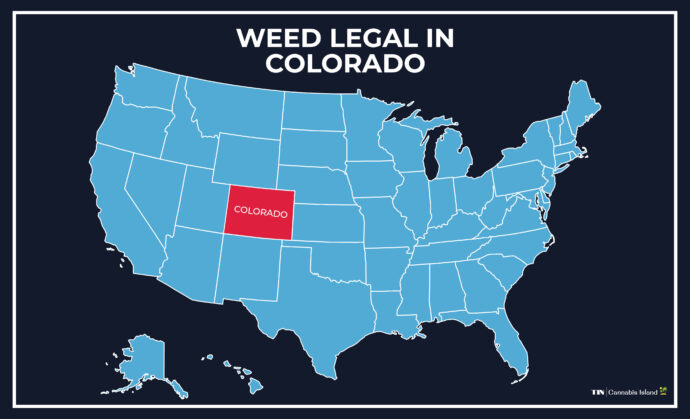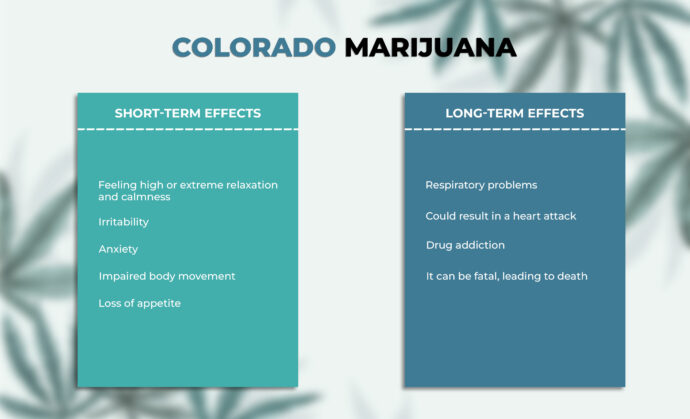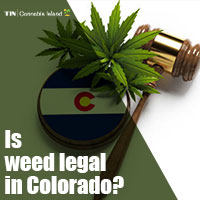Around nine-in-ten Americans favor some form of marijuana legalization, according to an April 2021 Pew Research Center survey. An overwhelming majority of U.S. adults (91%) say either that marijuana should be legal for medical and recreational use (60%) or that it should be legal for medical use only (31%). Just 8% say the drug should not be legal in any form.
In Colorado, where the influence of marijuana has become an integral part of the culture, it is available in various forms, from mild THC and CBD to potent Delta 8 and Delta 9.
The legalization to consume marijuana in Colorado, along with 29 other US states, has sparked debates and controversies. In this article, we will explore the regulations governing recreational marijuana laws in Colorado.

Understanding Colorado's Current Stance On Marijuana Legalization
It is legal to possess marijuana or use medical, recreational marijuana in Colorado. It is a law passed about a decade ago, in November 2012, making Colorado among the first two states to legalize marijuana use.
However, it is not smooth sailing, as the law is not straightforward. You can still get arrested for possessing marijuana if you are not familiar with the intricate details of this law.
You, therefore, need to familiarize yourself with the federal laws of legal marijuana possession to avoid getting on the wrong side of the law.
Legalization Of Medical Marijuana In Colorado: What You Need To Know
Medical marijuana use is legal in Colorado. However, you need a medical card from the Colorado Medical Marijuana Registry to obtain marijuana purchase medical marijuana in Colorado. People prefers to buy online weed as it is difficult to buy offline.
The law requires dispensary attendants to scan your medical card to verify its validity before selling medical marijuana.
The History Of Recreational Marijuana In Colorado
The history of recreational cannabis in Colorado can be traced back to the 19th century when it is believed there was some psychoactive cannabis being sold in pharmacies. But it was not until the 20th century when hemp cultivation began after Mexican laborers came to work in the state.
The drug then became prevalent among Colorado’s middle class, who would use it as a recreational drug for its therapeutic benefits. Others grew marijuana for purposes of reselling to supplement their income.
In the 1960s and 1970s, recreational use of cannabis became prevalent among middle-class youth, and inevitably, the anti-cannabis laws became more relaxed.
Several attempts were made to legalize cannabis in Colorado. Finally, in November 2012, Colorado joined Washington as the first state to legalize recreational cannabis use among adults 21 years of age or older.
Marijuana Prohibition
In 1937, the federal government of Colorado banned cannabis possession and consumption through the Marijuana Tax Act. Anyone found possessing cannabis was charged with a federal felony and sentenced to serve time in prison.
Cannabis Eradication
All efforts to eradicate the hemp plant proved futile, as birds helped rapidly spread hemp seeds. It resulted in the growth of marijuana look-alikes in vacant fields.
An example of such a case was in 1951 when local authorities attempted to burn down a field of wild hemp that they mistook for marijuana. The efforts were futile as the field became what they termed as ‘too moist’ to burn.
Drug Laws For Tourists In Colorado
In November 2012, Colorado authorities passed a law that legalized the possession and consumption of small amounts of marijuana. It included out-of-state visitors who were above the age of 21 years.
As a visitor in Colorado, you have no special requirements to purchase marijuana.
However, if you need medical marijuana, you should obtain a valid medical card from the Colorado Medical Marijuana Registry.
Supreme Court Legalizes Marijuana In 2012
In 2012, Colorado became one of the first states to legalize marijuana for recreational use, and since then, the state has continued to refine and expand its marijuana laws.
Most recently, in 2020, Colorado Governor Jared Polis signed a bill into law that would allow for the expungement of certain marijuana-related criminal records. The law would apply to individuals convicted of possessing up to two ounces of marijuana, and it is expected to affect tens of thousands of people in Colorado.
While Colorado’s marijuana laws are relatively permissive compared to other states, it is essential to note that there are still limits and regulations on the use and sale of marijuana. For example, it is illegal to smoke marijuana in public places, and individuals under 21 are not allowed to possess or consume marijuana.
Additionally, federal law still prohibits the possession and use of marijuana, although the federal government has largely taken a hands-off approach to enforce these laws in states where marijuana is legal.
2021 Legislation State Law Colorado
In 2021, the state of Colorado made significant changes to its marijuana laws. One of the most notable changes was the passing of a bill that allows for the home delivery of cannabis products. This new law makes Colorado one of the first states in the US to allow for legal cannabis delivery services.
Also, the state passed legislation that expunges past convictions for marijuana possession of up to two ounces, allowing individuals to clear their records and move on from their previous charges.
Furthermore, Colorado expanded the range of medical conditions eligible to consume marijuana, including autism spectrum disorders and disabling conditions that result in chronic pain.
These legislative changes reflect a continued trend towards increased acceptance and legalization of marijuana, both for medicinal and recreational purposes, in states across the US.
Marijuana Legalization In Colorado: Amendment 64
In 2012, voters passed a law, Amendment 64, which legalized the possession and consumption of recreational marijuana. The Legislature then tasked the Department of Public Health and Environment and the Department of Revenue to oversee and regulate the cultivation and sell marijuana.
Through taxation alone, Colorado collected over $30 million in tax revenue from marijuana sales in 2014, significantly increasing over the next year for recreational and medical marijuana.
A team has been put in place to control drug trafficking and the illegal use of marijuana and ensure the following:
Marijuana is not sold to underage persons.
Criminal gangs and cartels do not control the sale of marijuana.
Legal possession of marijuana is not used as a cover-up for the sale or consumption of other illegal activities.
No violence is used in the cultivation and distribution of marijuana.
Residents do not abuse the substance leading to public health issues.
Marijuana is not grown on federal land.
Is Marijuana Legal In Colorado?
Yes, the cultivation, possession, and consumption of marijuana are legal in Colorado. It came with the passing of the voters’ Amendment bill of 2012.
As per the law, marijuana is legal for use in Colorado, but you have to stick to the guidelines to avoid getting on the wrong side of the law.
Please note that in Colorado, if you are caught in illegal possession of marijuana, you can be punished by serving time in prison or paying a fine not exceeding $100.
Drug Decriminalization In Colorado: Understanding The State's New Law
Colorado voters have approved decriminalizing certain psychedelic substances for personal use, which can only be obtained at licensed centers.
It was done in a bid to offer more mental health treatment options in a state voted to be the poorest at dealing with such issues.
The approved drug substances include psilocybin in magic mushrooms, dimethyltryptamine (DMT), ibogaine, and mescaline.
These drugs are mostly used in treatment facilities licensed by state regulations, where patients can use them under supervision.
Effects Of Marijuana Legislation
Voters passed a majority rule which saw the federal government of Colorado legalizing the possession and using marijuana in 2012. Per the state law, one can only possess not more than 1 ounce of hemp flower and not more than 800 mg of edibles per transaction.
If you get caught with anything more than the approved limit, you are subject to a punishment of time in prison or a fine of up to $100 and 24 hours of community service.
The move to make these punishments lenient was deliberate to reduce drug-related crimes. The effects of these have been quite visible over the years.
Some of the key effects of marijuana legalization in Colorado include the following:
Generation of more tax
Reduced violent drug-related cases
Decrease in jail population
Creation of more employment opportunities
Increased civil liberties
Reduced abuse by law enforcers.

The Risks To Health Posed By Marijuana Legalization In Colorado
Marijuana is one of the most commonly used drugs in the USA, especially among the youth. Over 43.4 million people are estimated to use marijuana and its by-products, such as edible THC and CBD gummies, daily.
Although there are several claims of the drug having health and therapeutic benefits, it is essential to remember that marijuana is just like any other drug.
Therefore, long-term use or abuse, whether for medical or recreational purposes, will likely cause specific side effects. The effects vary from one person to another, especially in young users who can be vulnerable, leading to addiction or other adverse side effects.
Despite this, the federal state of Colorado has legalized the consumption of marijuana for recreational or medical purposes to anyone over the age of 21. It has unfortunately paved the way for some people to abuse the drug. The legal and health risks of marijuana can either be short-term or long-term effects.
Short-term effects of marijuana include:
Feeling high or extreme relaxation and calmness
Irritability
Anxiety
Panic and hallucinations
Impaired body movement
Impaired judgment
Difficulty in problem-solving
Loss of appetite
Long-term effects might include:
Alters cognitive function, resulting in impaired thinking, memory loss, and loss of attention.
Respiratory problems
Could result in a heart attack
Drug addiction
It can be fatal, leading to death
Ways To Purchase Marijuana In Colorado
Medical and recreational marijuana products are available at selected licensed dispensaries or licensed retail marijuana stores nationwide.
About 500 dispensaries in Colorado offer a wide range of marijuana products, such as THC and CBD gummies, hemp flowers, and vape cartridges, among other options.
To purchase medical marijuana, you must have a valid medical card and a doctor’s prescription.
Recreational marijuana, on the other hand, does not need much. You only need a valid ID card, state-issued driver’s license, passport book or card, or an active military ID to prove you are of legal age to purchase marijuana products.
Is Home Cultivation Of Marijuana Plants Legal?
Yes, it is legal to grow marijuana within your private residence, but you should not commercialize it or sell retail marijuana. The law, however, states that the property owner must be 21 or older and can only grow up to six marijuana plants.
Additionally, one can possess all marijuana smoke produced from the plants provided it remains enclosed; within the private residency.
Medical Marijuana: Exploring Its Health Benefits
A lot of research has been done to establish the benefits of marijuana. From findings, several scientists and marijuana enthusiasts have proven this product to have a wide range of health and therapeutic effects.
It is why Colorado has a statewide program for patients with qualifying medical conditions to access medical marijuana.
As medical marijuana patients, one will receive a registry identification card from the Colorado Medical Marijuana Registry after paying an application fee and filing out medical forms. Please note that these cards can only be issued to Colorado residents.
In Colorado, medical marijuana is used to relieve pain and symptoms of certain medical conditions. Doctors can prescribe medical marijuana to help with the following:
Easing pain associated with chemotherapy.
Relieving chronic pain from ailments such as arthritis.
Fixing poor appetite and nausea.
Helping one cope with mental health issues such as anxiety, depression, and PTSD.
Helps to improve sleep.
Slowing the development of Alzheimer’s disease.
Reducing the symptoms of multiple sclerosis.
Offering the therapeutic benefit of calmness and relaxation.
FAQs Regarding The Legality Of Weed In Colorado
Who Can Purchase Marijuana In Colorado?
Colorado has legalized the purchasing, possession, and consumption of marijuana to any adult above the age of 21, regardless of whether you are a resident or visitor.
Do I Need Any Special License to Purchase Marijuana in Colorado As A Visitor?
The state has made it possible for visitors who reside out of Colorado to purchase recreational marijuana without needing a special license. You will, however, need a medical card to buy medical marijuana.
How Much Marijuana Can An Individual Purchase in Colorado At One Time?
The limit on marijuana purchase is 1 ounce for hemp flowers and up to one ounce or 800 milligrams of edibles, that is, the THC, CBD, Delta 8, and Delta 9 gummies. The purchase limit applies to residents and visitors alike.
Can I Smoke Marijuana in Public in Colorado?
No, it is illegal to use marijuana in public as it is considered a petty offense, especially in parks and amusement areas, in a car, ski areas, sidewalks, concert venues, businesses, and even in hotels, as management reserves the right to prohibit using marijuana.
Conclusion Regarding Weed Legal In Colorado
The Colorado law of marijuana legalization resulted from a combined effort from the people and the government. These new laws ended the stigmatization of smoking weed or using hemp-related products.
Today, it is one of the most popular and commonly enjoyed recreational drugs in Colorado. It is also known to be among the greatest sources of original and good-quality weed.
The laws, however, keep on changing and have some loopholes. It is, therefore, best to stay up to date with the current regulations regarding possessing marijuana to avoid getting on the wrong side of the law.
Also, remember to possess marijuana responsibly, as it has been shown to have short-term and long-term effects when consumed marijuana abused leading to health risks.




